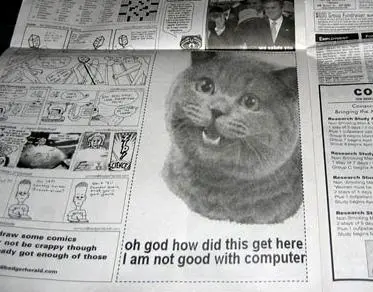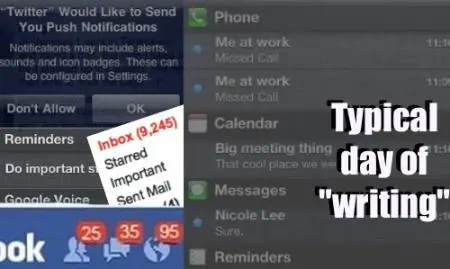My brother is texting me from Colorado about the election. There are approximately 800 more pressing things I should be doing, but I go back and forth with him about the vote on whether to legalize weed in his state. Between texts, I try to respond to an email but my keyboard has decided that it hates the letters G, T, B, and N, making it impossible for me to tell anyone “no” or even “maybe.”
“It’s got to be a short in the keyboard,” my brother texts. This is no good. I have a column (this one) due stat. I tell him so, because he is a computer guru and should therefore be able to fix any technological problem despite being 1,400 miles away. “What’s your column on?” he asks.
“Technology, and whether it’s helping or hurting our productivity. The irony is not lost on me.” I am ripping letters off the keyboard and shooting pressurized air into every crevice. The sound terrifies my cat, who leaps across my office, leaving a gash down my arm. I am bleeding like an emo kid. USB cords are tangled all over my desk as I search for another functional keyboard. My phone buzzes as my brother texts advice. Others are asking where I’m watching election results. For the thousandth time, I find myself pining for a quiet room with nothing in it but a desk, a typewriter or notebook, and maybe an Irish coffee.
I wish I were making all this up. I’m not. My love/hate relationship with technology often bends toward the “hate” end of that scale, but let’s be honest: If there were no benefits to the computer age, I would actually be using a notebook rather than looking for a replacement keyboard right now. I feel like one of those people who threatens to move to Canada if their candidate isn’t elected, then backtracks because it’s, you know, pretty cold up there.
The question remains: Do modern conveniences and the internet make us more productive as writers or just more distracted? Solow's Productivity Paradox (named for Nobel Laureate/economist Robert Solow) says, "You can see the computer age everywhere but in the productivity statistics." Let's figure out whether it's true. It’s laptop vs. typewriter, internet vs. card catalog, analog vs. digital, screen-induced eye strain vs. pen-induced hand cramp…a battle to the death.
Factor: Access to information
Back in my day, if you wanted to know how many people a year are killed by hippos or how fast you’d have to be in order to outrun one, you’d have to walk through the snow, up the mountain to a building called a library. Once there, you’d need to stick your face into an actual card catalog and call upon your intimate knowledge of the Dewey decimal system in order to find the answers. If you wanted to interview an expert for some aspect of the book you were writing, you’d have to track down his or her phone number, dial it using a spinning disc with holes in it, and make an appointment. Today, you can sit in the comfort of your office and use Google to find instant answers to damn near any question or to find the contact details for almost anyone. This more efficient way of accessing information significantly shortens our research time and leaves us with more time for actual writing.
So the point goes to: Computers
Factor: Accurate information
The vast resources at our fingertips are useful, to be sure, but they're also fraught with peril. Many believe that Satan is the father of lies, but I'd argue that the title might go to the internet. Going back to the question of how many folks die via hippo each year—an issue that's relevant to each of our lives—we find answers ranging from "probably none" to "200 to 300" to "780" to "2,900 in Africa alone" to "12045 if my math is correct" to "8094058 human injuries over the span of one hippos [sic] life." The library card catalog might not have been the most convenient method of finding information, but by God, you could be assured that the answers you found within its dusty drawers were not provided by the 15-year-old pothead jackass who lives next door.
So the point goes to: Typewriters
Factor: Education and resources
It's possible to find a local group of writers you can regularly meet with face-to-face to workshop material, gather inspiration, and help each other meet goals. Of course it is. But what if you don't live in a city buzzing with literary energy? Maybe you live in a small town, an igloo, or some place where you have to risk being one of the 8094058 people attacked by hippos each year in order to get to your village. Then what? Internet to the rescue.
Online writers workshops and writing courses like the ones offered here on LitReactor can be a huge boost to productivity. I know what you're thinking: "Yeah, but you write for LitReactor, so you're biased." I see why you'd say that, but let me be totally straight with you: I don't contribute to LitReactor for prestige (blog posts are not the path to fame), for money (I started as a volunteer who didn't make a penny), or for lack of anything else to do (just ask my poor editors how far behind I get). I do it because after I'd stopped working at the magazine I was editing, I did nothing but sit around and talk about how I was going to write some short stories, going to write a novel, going to get some stuff published. Talk, talk, talk. Then I stumbled across the site, took a few courses, read some craft essays, stopped talking, and started writing. I write columns like this one because I feel like I owe these guys a little something for being the thing that finally helped me put some words on the page. There are more online support groups, workshops, educational courses, contests, and resources than ever right now and even if you don't live in a remote igloo, you'd be silly not to take advantage them.
So the point goes to: Computers

Factor: Ease of use
Things my typewriter never said to me: "This is an application downloaded from the internet. Are you sure you want to open it?" "An update is available. Would you like to download it now?" "How about now?" "Now?" "A virus has been detected." "Incorrect password. Please try again."
Things my typewriter never forced me to endure: The spinning rainbow beach ball of death, the blue screen of death, crash reports, hard drive crashes, shorted-out keyboards, lost work caused by power outages.
Point: Typewriters
Factor: Self-publishing options

Factor: Creativity and flow
How much time do you spend marketing your work online, managing social media profiles, answering emails, updating your websites, or using online tools to promote your readings or events? If you're like most authors, the answer is more than an hour a week. In some cases, WAY more than an hour a week. Pre-interwebz, you might have spent that time reading, daydreaming in the park, scribbling in a notebook, or brainstorming plot twists...you know, things that invite the muse to hang out with you. (You also might have spent it watching Price Is Right or tentacle porn, but let's pretend that's not the case.)
So not only has the digital age gobbled up time that you might've spent fostering creativity, every notification of new email, tweet, or Facebook message prevents you from getting "in the zone" and interrupts your flow of thoughts. Dave Eggers put it this way in an interview with The Guardian: "Writing is a deep-sea dive. You need hours just to get into it: down, down, down. If you’re called back to the surface every couple of minutes by an email, you can’t ever get back down. I have a great friend who became a Twitterer and he says he hasn’t written anything for a year."
Point: Typewriters
Factor: Revisions
For those too young to remember, Wite-Out—or "Liquid Paper" if you want to sound less like you're discussing a severe snowstorm or Aryan field trip—was a gloopy white liquid used to paint over mistakes you made while typing. (You could also use it in conjunction with those little round stickers that reinforced the holes in loose-leaf paper to give yourself a redneck French manicure, but that's a tip for another day.) No matter how careful you were, it would always end up smeared all over the page and across your face because no one was ever patient enough to wait for it to fully dry before trying to type another letter over the error. If you were using a notebook rather than a typewriter, there'd be scribbles and cross-outs where you'd made mistakes with your pen, or eraser debris in the margins of the pages where you'd made mistakes with a pencil. The advantage to these primitive and ridiculous methods of error correction was that it was much less tempting to rewrite each sentence fourteen times before moving forward with the story you were working on. So you kids with your word processing fanciness and backspace keys, get off of my lawn.
Still, the point goes to: Computers
Factor: Distractibility and procrastination
We have come to the ultimate argument against modern conveniences...the idea that for every minute technology shaves off our research and revision time, it devours at least ten with unnecessary emails, social media distractions, and the ever-present siren call of auto-tuned memes and cat pictures. The cold white stare of a blank page is terrifying. Miniature puppies in teacups, less so. Sitting at an internet-connected computer, a writer's barrier to procrastination is less of a barrier and more of a fragile gossamer veil. There are ways around it: creating a not-to-do list as well as a to-do list ("I will not check Facebook until 1pm"), disconnecting your internet completely, or using programs like Leechblock for Firefox, StayFocused for Chrome, SelfControl, RescueTime, or Freedom. Still, there's no Reddit or Buzzfeed button on a typewriter.
Point: Typewriters
The final score? Computers, 4. Typewriters, 4.
Looks like it's up to you to break the tie. (I, um, did that on purpose.) Think about it and tell us the truth: Would you get more actual writing done sitting at a desk with nothing but a typewriter or notebook, or in a modern office with an internet-connected computer?

About the author
Kimberly Turner is an internet entrepreneur, DJ, editor, beekeeper, linguist, traveler, and writer. This either makes her exceptionally well-rounded or slightly crazy; it’s hard to say which. She spent a decade as a journalist and magazine editor in Australia and the U.S. and is now working (very, very slowly) on her first novel. She holds a B.A. in Creative Writing and an M.A. in Applied Linguistics and lives in Atlanta, Georgia, with her husband, two cats, ten fish, and roughly 60,000 bees.








